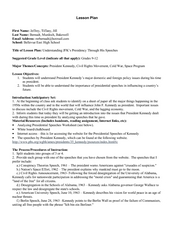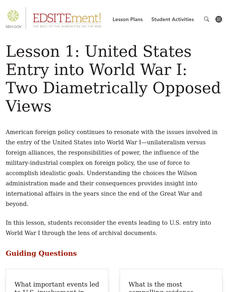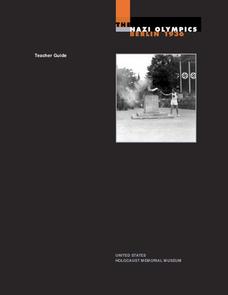Curated OER
Hypothetical Heights
Students participate in an interdisciplinary lesson to discuss improvements that would make them want to return to a previously poor neighborhood. In this civics lesson, students work in a budget to make a plan to better their...
University of California
Anti-Communism at Home
Have you ever been accused of something without cause? The sixth installment of an eight-part series asks scholars to create a museum exhibit on the anti-communist activities in the United States at the start of the Cold War. To make...
Curated OER
Liberty and Democracy for All?
Students consider what they already know about democracy and examine how viable democracy is for Middle Eastern nations such as Egypt and Saudi Arabia.
Curated OER
Integrity and Firmness is All I Can Promise: The Washington Presidency
High schoolers engage in a lesson which addresses George Washington's leadership as President of the United States. They review a variety of letters written by Washington online, and prepare reports for the class.
Curated OER
Understanding JFK's Presidency through his Speeches
Students reflect and discuss the major events that happened in the United States in the 1950's and 1960's. In this U.S. History lesson, students read and analyze the famous speeches during this time frame, then complete a worksheet that...
Foreign Policy Research Institute
Categories of Cold War Histiography
While the objective is to provide an overview of the Cold War in preparation for further study, this resource addresses the topic at a rather advanced level, and might need its own introductory lesson. The handouts include terms such as...
Curated OER
Multiple Perspectives on the Korean War
Learners interpret historical evidence presented in primary and secondary resources. In this Korean War lesson, students examine and analyze primary sources regarding U.S. involvement in the Korean War.
Curated OER
Jazz in America
Eleventh graders explore Jazz in America. They examine greats in Jazz, such as Duke Ellington. They are also to discuss the cultural implications of the music itself.
Curated OER
Reporting on the 1920s
Use this roaring 1920s history lesson to have young writers research primary and secondary sources. They use their research to examine the events or famous public figures of the time period. Next, they imagine they're in the 1920s and...
Foreign Policy Research Institute
A Geography Lesson
Fewer and fewer people have a strong grasp of world geography, but this activity helps learners understand geopolitics by creating their own original historical map. The activity requires selecting a country from the list provided,...
Curated OER
Terror Tantrum?
Pupils explore elements that help shape political and economic relationships between different countries and examine the effects of a recent terrorist attack in Saudi Arabia.
Curated OER
United States Entry into WWI: Two Diametrically Opposed Views
Students reconsider the events leading to US entry into WWI through the lens of archival documents.
Curated OER
The Debate in the United States over the League of Nations
Eleventh graders read the words and listen to the voices of some central participants in the debate over the League of Nations.
Curated OER
Maps of Indian Territory, the Dawes Act, and Will Rogers' Enrollment Case File
Students, in groups, analyze one map at a time, first the 1885 map, then the 1891 map. After they have completed the analysis sheets, they compare the two maps and answer questions imbedded in the plan.
Curated OER
The U.S. Trade Embargo on Cuba
Students examine perspectives for and against the U.S. trade embargo on Cuba, develop a position on the embargo and articulate viewpoints in a public forum.
Curated OER
Presidential Debate Primer
High schoolers examine the function of presidential debates. In this civics lesson, students view segments of presidential and vice presidential debates. High schoolers analyze the answers given in the debates and identify the platforms...
Foreign Policy Research Institute
Understanding the Koreas
Though this resource was designed in 2005, US tension with North Korea remains a relevant topic for exploration and understanding. Unfortunately, this lecture and reading-based lesson plan is unlikely to engage the class. The end product...
National Endowment for the Humanities
Lesson 2: The Debate in Congress on the Sedition Act
Pupils research and discuss the provisions in the Constitution that supported the arguments for and against the Sedition Act. They articulate objections to and arguments in favor of the Sedition Act.
Curated OER
Thomas Jefferson on the Sedition Act
High schoolers research and cite arguments Jefferson used in objecting to the Sedition Act. They discuss Jefferson's opinion on how constitutional questions about the Sedition Act could be resolved.
Curated OER
From the President's Lips: The Concerns that Led to the Sedition (and Alien) Act
Students research and briefly summarize the international situation during John Adams's presidency. They list the concerns that led to the Sedition Act and describe it.
Curated OER
Louisiana Purchase
Students explore U.S. territorial expansion. In this Louisiana Purchase lesson, students investigate how the purchase was funded and determine how diplomatic actions were part of the land transfer. Students analyze several primary...
US Holocaust Museum
Nazi Olympics: Berlin 1936
The Olympics are about more than sports—at times, the games are also a place of racism and prejudice! Pupils investigate the 1936 Olympics in Berlin, Germany. They analyze the meaning behind the materials included in the United States...
Curated OER
President Madison's 1812 War Message: Answers Lead to More Questions
Learners investigate President Madison's case for declaring war against Great Britain. Students assume the roles of newspaper reporters and cite key points in Madison's argument for declaring war, and hypothesize about primary documents...
Curated OER
President Madison's 1812 War Message: A Brief Overview
Students investigate President Madison's War Message. Students read the message and discuss any information they may have misunderstood. Students hypothesize about what kinds of documents might help them find answers to their questions.

























